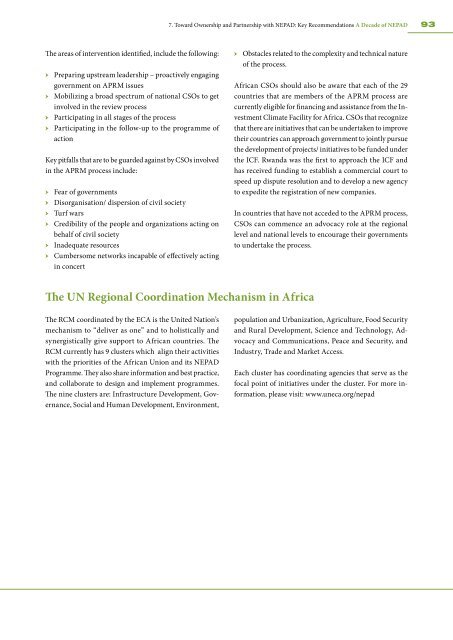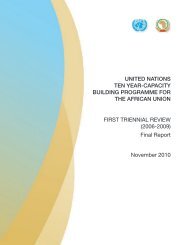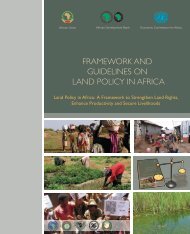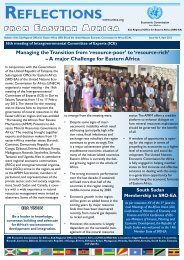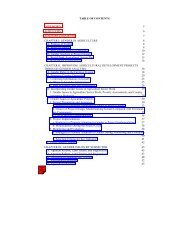A Decade of NEPAD - Economic Commission for Africa - uneca
A Decade of NEPAD - Economic Commission for Africa - uneca
A Decade of NEPAD - Economic Commission for Africa - uneca
Create successful ePaper yourself
Turn your PDF publications into a flip-book with our unique Google optimized e-Paper software.
The areas <strong>of</strong> intervention identified, include the following:<br />
ӹ Preparing upstream leadership – proactively engaging<br />
government on APRM issues<br />
ӹ Mobilizing a broad spectrum <strong>of</strong> national CSOs to get<br />
involved in the review process<br />
ӹ Participating in all stages <strong>of</strong> the process<br />
ӹ Participating in the follow-up to the programme <strong>of</strong><br />
action<br />
Key pitfalls that are to be guarded against by CSOs involved<br />
in the APRM process include:<br />
ӹ Fear <strong>of</strong> governments<br />
ӹ Disorganisation/ dispersion <strong>of</strong> civil society<br />
ӹ Turf wars<br />
ӹ Credibility <strong>of</strong> the people and organizations acting on<br />
behalf <strong>of</strong> civil society<br />
ӹ Inadequate resources<br />
ӹ Cumbersome networks incapable <strong>of</strong> effectively acting<br />
in concert<br />
7. Toward Ownership and Partnership with <strong>NEPAD</strong>: Key Recommendations A <strong>Decade</strong> <strong>of</strong> <strong>NEPAD</strong><br />
The UN Regional Coordination Mechanism in <strong>Africa</strong><br />
The RCM coordinated by the ECA is the United Nation’s<br />
mechanism to “deliver as one” and to holistically and<br />
synergistically give support to <strong>Africa</strong>n countries. The<br />
RCM currently has 9 clusters which align their activities<br />
with the priorities <strong>of</strong> the <strong>Africa</strong>n Union and its <strong>NEPAD</strong><br />
Programme. They also share in<strong>for</strong>mation and best practice,<br />
and collaborate to design and implement programmes.<br />
The nine clusters are: Infrastructure Development, Governance,<br />
Social and Human Development, Environment,<br />
ӹ Obstacles related to the complexity and technical nature<br />
<strong>of</strong> the process.<br />
<strong>Africa</strong>n CSOs should also be aware that each <strong>of</strong> the 29<br />
countries that are members <strong>of</strong> the APRM process are<br />
currently eligible <strong>for</strong> financing and assistance from the Investment<br />
Climate Facility <strong>for</strong> <strong>Africa</strong>. CSOs that recognize<br />
that there are initiatives that can be undertaken to improve<br />
their countries can approach government to jointly pursue<br />
the development <strong>of</strong> projects/ initiatives to be funded under<br />
the ICF. Rwanda was the first to approach the ICF and<br />
has received funding to establish a commercial court to<br />
speed up dispute resolution and to develop a new agency<br />
to expedite the registration <strong>of</strong> new companies.<br />
In countries that have not acceded to the APRM process,<br />
CSOs can commence an advocacy role at the regional<br />
level and national levels to encourage their governments<br />
to undertake the process.<br />
population and Urbanization, Agriculture, Food Security<br />
and Rural Development, Science and Technology, Advocacy<br />
and Communications, Peace and Security, and<br />
Industry, Trade and Market Access.<br />
Each cluster has coordinating agencies that serve as the<br />
focal point <strong>of</strong> initiatives under the cluster. For more in<strong>for</strong>mation,<br />
please visit: www.<strong>uneca</strong>.org/nepad<br />
93


